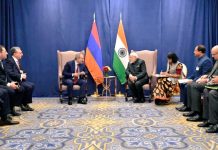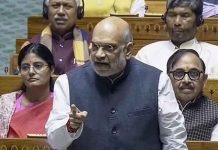The dynamics that made the engagement possible during Musharraf’s period no longer exist. Several new factors are at play in the regional geo-politics and in the relations between India and Pakistan that have made it increasingly difficult to go back to the formula, writes Riyaz Wani
When in 2005, India and Pakistan were engaged in a promising peace process on Kashmir, billboards displaying images of the then prime minister Manmohan Singh and the then Pakistan president General Parvez Musharraf, went up all across Srinagar. Nobody seemed to mind them, least of all the political parties or the media in the country. There was a reason for this: The two leaders were discussing Four Point Proposals, a four stage incremental process for Kashmir resolution. The steps were: identification of the regions in Kashmir for solution, demilitarization, self-governance and a joint management or a consultative mechanism between India and Pakistan on the then state.
It was actually the former Prime Minister, Atal Bihari Vajpayee, who had begun the promising negotiations with Musharraf, his then Pakistani counterpart, which were later followed up by the former Prime Minister Manmohan Singh.
The peace process which was largely pursued through back-channel seemed closest to pulling off a Kashmir solution. And by the autumn of 2007 as the two countries were reportedly preparing to sign the agreement, the lawyers’ agitation broke out in Pakistan culminating soon in Musharraf’s exit. This aborted the likely agreement. And the subsequent Mumbai attack also buried the peace process.
On February 5, 2023 when Musharraf passed away, Pakistan was celebrating Kashmir Solidarity Day. But this didn’t hide the fact that both the regional and Kashmir situation have changed beyond recognition since Musharraf’s time. There is not only no more engagement between India and Pakistan but New Delhi has also taken Kashmir off the table from any discussions with Islamabad.
The dynamics that made the engagement possible during Musharraf’s period no longer exist. Several new factors are at play in the regional geo-politics and in the relations between India and Pakistan that have made it increasingly difficult to go back to the formula.
The biggest change that has since taken place is the withdrawal of Article 370, which granted J&K its semi-autonomous position within the Indian Union, and the splitting of the former state into two union territories. This, from New Delhi’s point of view, has more or less ended Kashmir as an issue between the two neighbours. India has now changed its goalpost. It seeks the return of the part of Kashmir under the jurisdiction of Pakistan. And it is loathe to the idea of resuming dialogue with Islamabad except on its own terms. And Pakistan’s response to this so far shows that the country is in no position to challenge India’s altered position on Kashmir. While Islamabad may not have reconciled to the constitutional changes in the region it claims, the country has now kind of gotten used to the new state of affairs in the region.
So Musharraf’s death, in a sense, is symbolic of the new state of affairs. Not only has the Kashmir issue, as we understood it earlier, drastically altered in its complexion, but J&K as a geographical entity has also transformed: It is no longer a state but divided into two union territories. What is, the once vaunted separatist conglomerate Hurriyat Conference has become extinct. Many of the grouping’s top leaders continue to be in jail or are under house arrest. This has hobbled its capacity to organize any political activity.
The public protests too have by and large disappeared, so has stone throwing. New Delhi has outlawed any sign of separatist activity in whatever form and disproportionately raised the cost for any leader or activist to go out and champion the cause.
Militancy, however, is still alive and kicking, even though the number of active militants has reduced drastically: the latest estimates put the number at around 100, which is one of the lowest since the militancy began over three decades ago.
In his term, Musharraf also presided over a progressive decline in the militancy, an ironic about-turn from the architect of Kargil war. The militant killings came down from 961 in 2004 to just 100 in 2013, indicating the militancy kept on declining long after Musharraf was gone. What is more, it was Musharraf who first instituted the ceasefire along the Line of Control in 2002. And it was this truce that India and Pakistan resurrected in February 2021. In a sense, in some of its features, the current uneasy calm between the two neighbours harks back to the Musharraf era.
In that sense, Musharraf was ahead of his time. He was the first Pakistani leader who dared to climb down from his country’s maximalist position on Kashmir and jettisoned the United Nations resolutions on the region. He pursued a pragmatic, flexible and what he was fond of calling an “out-of-box solution” for Kashmir. And he almost pulled it off if he hadn’t been ousted from power just when the two neighbours were bringing their long drawn dialogue process to fruition.
The situation has considerably transformed since and almost in every sense: regionally in terms of growing power disparity between India and Pakistan. And in J&K too which has since been divested of its semi-autonomous status. This, in turn, has altered the nature of the Kashmir issue as we understood it then.
Has Pakistan reconciled to the change in status quo? In public statements, the Pakistan government has stridently opposed it. But behind the scenes, the country has taken a pragmatic view of the new state of affairs. That is, if we take into account the fact that in 2021, the military establishment in the country was contemplating freezing the Kashmir issue for 20 years, reportedly in lieu of trade with India. No less than the prime minister of Pakistan, Shahbaz Sharif confirmed this in his speech in Pakistan Occupied Kashmir on February 5 on the occasion of the Kashmir Solidarity Day. That the plan failed at the last minute after the then Pakistan prime minister Imran Khan backed out of peace with India doesn’t detract from the fact that Islamabad has lost much of its bargaining power over Kashmir. And given the pathetic state of its economy, political turmoil and economic crisis, it looks unlikely that Pakistan will be in a position to pay attention to Kashmir. Putting Kashmir on the back burner, however, would be politically costly for any government in Islamabad.












